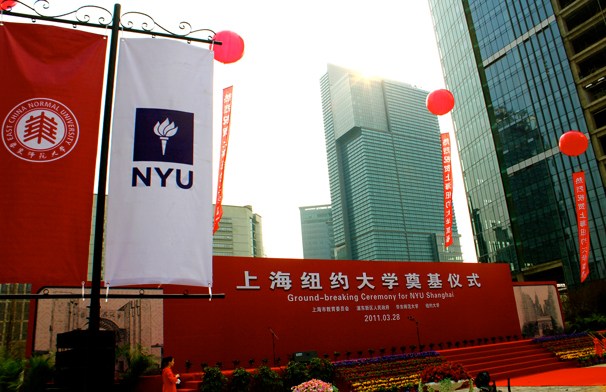NYU Shanghai vs. Chinese Universities
NYU Shanghai introduced a new higher education model within China, but its success is yet to be determined.
October 3, 2016
China is taking tips from the U.S. after NYU launched its second location abroad in 2012 in Shanghai, which was jointly founded by NYU and East China Normal University in collaboration with the Pudong New District government.
Though this branch is half a planet away from New York, the campus still maintains NYU’s concept of a global outlook while also absorbing the localized college traditions. This contrasts with the traditional Chinese university set up, which is controlled by the Ministry of Education of the People’s Republic of China. This international presence started an inquiry about the value of globalization in higher education, even at local universities.
The establishment of NYU Shanghai was partly motivated by the Shanghai government’s 2011 education reform plan. Shanghai education reforms include having two presidents each from China or the United States and considering Gaokao scores (China’s college entry test) during the admission process.
While these Westernized changes were made, NYU Shanghai still differs largely from local universities in that it has a smaller, more diverse student body. One of Shanghai’s top two universities, Fudan University, had 295 international students in this year’s freshman class of 3,719, while NYU Shanghai had about 300 freshmen, with half of them from over 30 different countries.
NYU Shanghai also offers students more academic freedom, liberal arts courses and more access to resources. NYU Shanghai students can switch their majors at any time in the first two years, but a student’s major at local universities is largely based on their Gaokao scores, and it’s hard to switch majors once it has been determined.
Peking University sophomore Marshall Shen studies law, and he said that it is very difficult to switch majors.
“Usually, popular majors offer less than 10 transfer spots based on grade ranking, but why do you want to switch the major if you rank high?” Shen said. “The undergraduate law school doesn’t even accept transfers.”
NYU Shanghai senior Sam Chen is currently studying abroad in New York, and he said that his liberal arts education opened his mind to
new things.
“The reading of Global Perspective strengthens my critical thinking skills and inspires me to form the basic concepts of sexuality, justice and moral,” Chen said. “Now I do have a distinctive position on LGBTQ right[s].”
Chen said that had he attended a local university, he would probably have to take courses about the basic principles of Marxism and Maoism, which do not have much overlap with the curriculum at NYU Shanghai. He also appreciates his small class sizes at the university, since the local universities normally have class sizes of over 100 people.
“The most impressive course I’ve ever had is the United States Constitution,” Chen said. “Although the professor graduated from Yale Law School [and] has a great academic reputation, only 15 students took this class. Everybody had a chance to interact with the professor, and he took great care of every student as well.”
NYU Shanghai students also have the same resources as the students studying at the New York campus: an academic resource center, a career development center and an opportunity to study in any of NYU’s 14 global locations.
However, since NYU Shanghai has not yet graduated a class, whether this is a successful model of education reform remains a question. NYU Shanghai freshman Sihao Chen believes that this conclusion could take some time.
“No one — including the presidents — know until the first graduating class steps into the society,” Sihao said. “But if you take a look at other jointly founded universities in China such as Duke Kunshan University and Xi’an Jiaotong-Liverpool University, their students actually get good jobs after graduation.”
He said these other universities already have their brands, and NYU Shanghai is still forming its own.
A version of this article appeared in the Monday, Oct. 3 print edition. Email CoCo Wang at [email protected].


























































































































































